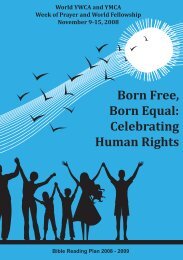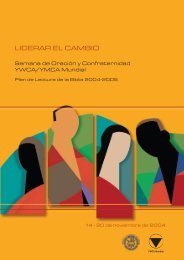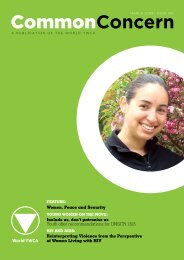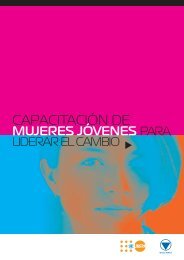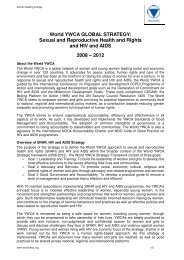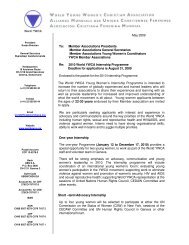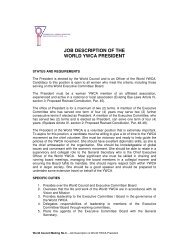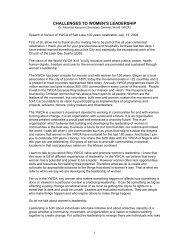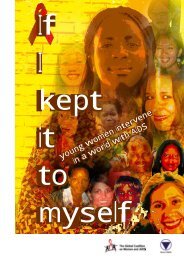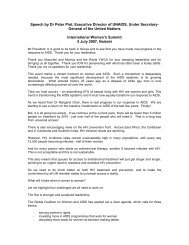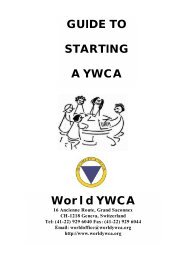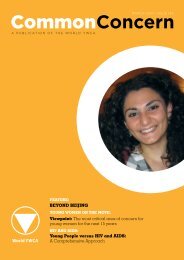World YWCA Let s talk about sex.pdf
World YWCA Let s talk about sex.pdf
World YWCA Let s talk about sex.pdf
You also want an ePaper? Increase the reach of your titles
YUMPU automatically turns print PDFs into web optimized ePapers that Google loves.
CC 3<br />
Editorial<br />
Daily, the world is confronted<br />
with staggering statistics<br />
related to women’s health:<br />
an unacceptable number<br />
of girl-child marriages, women dying in<br />
childbirth and young women exposed<br />
to <strong>sex</strong>ually transmitted infections and<br />
HIV. In many countries women and girls<br />
face violence and abuse resulting in<br />
gross violations of their human rights.<br />
Female genital cutting or mutilation,<br />
honour killings, forced sterilisations,<br />
criminalisation of HIV transmission all<br />
speak to the daily horrors many women<br />
face condoned by culture, customs,<br />
misapplication of religious norms and<br />
legislation.<br />
The <strong>World</strong> <strong>YWCA</strong> has, in the last<br />
decade, intensified its interventions,<br />
programmes and activities around<br />
HIV prevention and care. It is now<br />
evident that such interventions remain<br />
incomplete unless framed in a way<br />
that equally respond to <strong>sex</strong>ual and<br />
reproductive health and rights of<br />
women and young people. Violence<br />
against women is the ultimate<br />
manifestation of women’s lack of<br />
access to their rights. In February<br />
2009, the <strong>YWCA</strong> held a consultation<br />
on <strong>sex</strong>ual reproductive health and<br />
rights (SRHR) with a number of<br />
member associations and partners<br />
who collectively defined an approach<br />
for the <strong>YWCA</strong> movement to adopt. The<br />
proposed strategy guides the <strong>YWCA</strong><br />
in creating change in our communities<br />
and addressing laws and norms<br />
related to the triple challenge of<br />
<strong>sex</strong>ual and reproductive health and<br />
rights, HIV and violence against<br />
women (VAW).<br />
With the revised approach,<br />
the <strong>World</strong> <strong>YWCA</strong> is focusing<br />
on comprehensive prevention,<br />
comprehensive support and care<br />
within safe spaces for women and<br />
girls and a commitment to building<br />
evidence through documentation,<br />
monitoring and evaluation.<br />
The series of regional training<br />
institutes on SRHR, HIV and VAW that<br />
the <strong>YWCA</strong> movement is hosting in the<br />
next two years attest to our investment<br />
in a coherent global response<br />
while equipping individual women<br />
leaders with skills and tools to deliver<br />
at the local level and within their<br />
communities.<br />
While the <strong>World</strong> <strong>YWCA</strong> makes<br />
its own contributions, the movement<br />
continues to ask for accountability<br />
and commitment towards actions<br />
that invest in women and girls,<br />
uphold their human rights and<br />
end stigma and discrimination.<br />
The International Conference of<br />
Population and Development (ICPD)<br />
held in Cairo in 1994 concluded with<br />
pledges to achieve universal access<br />
to reproductive health services for<br />
every one in all countries by 2015.<br />
The Millennium Development Goals<br />
echo the ICPD goals and call for<br />
a specific commitment to reduce<br />
maternal mortality by 2015. Next year,<br />
the world will review the commitment<br />
government leaders made in the<br />
2001 Declaration of Commitment<br />
on HIV and AIDS. As advocates for<br />
women’s health, we must not only hold<br />
our leaders accountable for these<br />
promises, but also find ways to ensure<br />
they are achieved.<br />
In this issue of Common Concern<br />
we explore what SRHR means<br />
and how member associations,<br />
women leaders and civil society<br />
can contribute to a safe world free<br />
of violence and free of HIV where<br />
women’s reproductive health and<br />
rights are respected. •<br />
Nyaradzayi Gumbonzvanda<br />
General Secretary, <strong>World</strong> <strong>YWCA</strong><br />
www.worldywca.org




